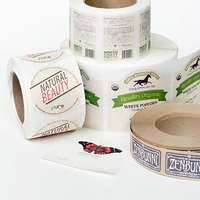Blog
Recent Posts
Not all Eco-Friendly Labels are Created Equal
Posted on
Smart purchasing professionals understand one of the more difficult parts of selecting authentic eco-friendly packaging materials is the ability to determine the difference between a truly sustainable packaging solution and well-marketed seemingly sustainable packaging solution. Brand owners of eco-friendly, natural, organic, and otherwise sustainable businesses understand this. They know it’s important for their own brand and marketing to effectively communicate the difference between their sustainable products and the competition who may only be interested in appearing to be ‘green’ or eco-friendly (aka Greenwashing). A great way for sustainable companies to demonstrate their commitment to sustainability is by using authentic eco-friendly (recycled, compostable, recycle-compatible) packaging and labels.
Many B2B companies are beginning to understand that retail customers are calling for more eco-friendly products, and in turn businesses demand more sustainable options from their supply chain. This shift toward sustainable packaging is accelerating rapidly, and with this there are new materials with claims that must be reviewed carefully to ensure the sustainability claim is accurate, valid, and not misleading. False sustainability claims are dangerous, not only to the environment but also to your business. For example, California has strict laws regarding the marketing of degradable plastics, requiring clear scientific evidence for environmental claims. The Federal Trade Commission has ‘Green Guides’ aimed at helping businesses avoid misleading environmental claims.
The purpose of this blog post is to help B2B Sustainable Packaging buyers decipher the truth in sustainable adhesive label claims. Many label products marketed as eco-friendly are rather weak sustainable solutions, and while they may solve one problem they may create other sustainability issues in other areas. Fortunately for each of these situations there are better solutions which are more sustainable. Here are a few weak sustainability claims to watch out for:
Earthfirst PLA Labels
What is it? Earthfirst PLA is a flexible polymer label made from corn rather than petroleum-derived chemicals.
Why is it problematic? Corn-based plastics require the use of resource intensive crops that require signification irrigation (water), chemicals (herbicides and pesticides), and may be made from GMO corn. These labels are neither recyclable nor compostable (adhesives on these labels are not compostable, only the face stock is compostable).
Suggested alternatives: Bioplastic made from wood cellulose. It is certified compostable and available in silver, white and transparent materials [#805-1, #806-1, #807-1]
Recycled Vellum Labels
What is it? Vellum Labels made from 100% recycled materials.
Why is it problematic? Modern Recycled Vellum is made from rag or plasticized cotton, and carry the same toxic issues as plastic, which we want to avoid. If eliminating excessive plastics is desired, this is not a good option as these labels are not recyclable or compostable, and continue to load our landfills with plastics.
Suggested alternative: White Recycled material with Recycle-Compatible Adhesive [#906-1]
Biostone Labels
What is it? Tree-Free label material made from bonded calcium carbonate (common substance found in rocks as the minerals calcite and aragonite). The calcium carbonate used is waste material collected from marble quarries.
Why is it Problematic? The calcium carbonate is bonded using polyethylene which is plastic usually made from petroleum. Polyethylene is the same plastic used to make plastic grocery shopping bags, which have been outlawed in many communities. These labels are not compostable or recyclable, and have the same toxic issues as plastic (watch out for misleading claims of biodegradability!).
Suggested alternative: Compostable Sugarcane [#800-1], or Recycled with Recycle-compatible adhesive [#906-1]
Kraft Labels
What is it? Brown natural-looking paper adhesive label. Can be non-recycled virgin paper or recycled.
Why is it Problematic? While Recycled Kraft paper is available, recycled labels alone are not necessarily recyclable or recycle-compatible themselves due to the adhesives used, therefore it is not a helpful solution where recycling or composting is required.
Suggested alternative: Compostable Sugarcane [#800-1]
Kona Paper Labels
What is it? Made from a mixture of repurposed coffee bean bag fiber and other post-consumer waste material.
Why is it Problematic? Similar to Recycled Kraft Paper, Kona paper labels are recycled but are not recyclable, recycled-compatible, or compostable due to the conventional adhesives used. They are not a good solution where packaging is required to be recyclable or compostable.
Suggested alternative: Compostable Sugarcane [#800-1], or Recycled with Recycle-compatible adhesive [#906-1]
At Elevate Packaging and PURE Labels, we only carry sustainable packaging and labels. We've been exclusively dedicated to sustainable packaging solutions since the day our doors opened for business. So it’s safe to say, we know our stuff!
Since 2000, Elevate Packaging carries the widest range of compostable, recycled, and recycle-compatible labels, and the only labels with compostable adhesive. Please take a look for yourself at the leading sustainable material options on our website or call us to discuss your sustainability needs, we love talking sustainability with like-minded companies and are happy to help! +1.773.276.4554
Related Posts:

New PURE Labels Ecommerce Site
Easier and Faster Online Shopping The new and improved PureLabels.com ecommerce site is live! Enjoy faster load times, less 'clicks' to order eco-friendly labels, and a fun shopping experience. If you use a mobile phone, tablet, or other mobile device, we've even improved the mobile shopping experience also for your favorite ecofriendly [...]
 Loading... Please wait...
Loading... Please wait...

